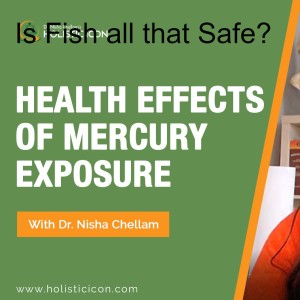16.8K
Downloads
67
Episodes
Dr. Nisha Chellam is a Board certified Internist who is also board certified in Integrative and Holistic medicine. She believes that diminished health and vitality can be reclaimed by just about any proactive person at any age. Dr. Chellam practices functional medicine in Novi, Michigan where she incorporates Nutrition, Fitness, hormone balance, and permanent weight control. Every week, Dr. Nisha gives you tips on how to take control of your health because YOU are your best doctor.
Episodes

Tuesday Sep 28, 2021
Is Fish all that Safe?
Tuesday Sep 28, 2021
Tuesday Sep 28, 2021
Effect of Mercury Exposure on Your Health
Mercury is a metal element that naturally exists in nature as found in air, water as well as soil. Its presence starts to impact our health if it gets in direct contact with this metal through breathing, intake or physical contact. This can then lead to various neurological, cardiovascular (heart-related), digestive, hormonal as well as dermatological (skin-related) issues.
The last 50 years have seen an evident rise in the level of mercury exposure, a big contributor being the industries using coal as fuel which when burned releases mercury in vapour form thus inevitably making it a part of our direct ecosystem. It has subsequently caused a tremendous rise in medical cases with harmful mercury exposure at its root.
In this blog we will delve deeper to understand this phenomenon of mercury exposure, how it happens, what are its signs, what can you do to reduce it and more. Let’s get started, shall we?
What is Mercury Poisoning?
Mercury is a natural metal found in the air, water and soil and is also commonly referred to as Quicksilver. It’s found in a thick, silver-shining liquid state under standard temperature and pressure. However, it can also vaporise and be inhaled by us as well as bind with certain molecules (especially all enzymes) causing serious issues in our biochemistry and subsequent metabolic problems.
High levels of mercury in our body can really harm the body systems especially the brain and kidneys leading to a condition called Mercury Poisoning. Mercury most commonly enters our body in a vapour state via inhalation of contaminated air, intake of contaminated food or getting in through our skin if it gets in direct contact.
Factors that determine the impact of mercury exposure on your health
The impact of mercury exposure on your body depends on:
- How much mercury gets into your body?
- In which forms has it entered your body?
- How did the mercury get into your body?
- How long have you been exposed to mercury?
How does mercury poisoning affect our health?
An abnormally high level of Mercury in our body may have significant negative impacts on our overall health, especially our brain, heart and gut health.
It’s observed that its impact are even more dangerous for babies and children since their brains are still under development.
What are the signs of Mercury exposure on your health?
Abnormal levels of mercury exposure may lead to detrimental impact resulting in both short-term as well as long-term signs such as below.
Short-term signs of unhealthy mercury exposure
- Severe respiratory irritation
- Digestive disturbances
- Marked renal damage
- Memory loss
- Impaired hearing, vision, speech
- Tremors
- Lack of coordination (while walking, writing etc.)
- Skin issues
- Difficulty in chewing and swallowing
Long-term signs of unhealthy mercury exposure
- Deteriorates nervous system
- Weakness
- Fatigue
- Anorexia
- Weight loss
- Disturbance of gastrointestinal function
If not identified and treated on time, it might also manifest itself into or worsen certain diseases and health conditions such as dementia, Alzheimer's, colitis and even cancer.
What are the common sources of mercury exposure?
Mercury exposure commonly occurs in two ways:
General Exposure
- Large predatory fishes (like shark, tuna, swordfish etc.)
- Dental amalgam used for fillings that contain mercury
- Vegetables & fruits from contaminated soils
- Soaps & cosmetics
- Use & damage of mercury-containing products (eg. batteries, fluorescent lamps)
- Waste
Occupational Exposure
- Manufacturing products containing mercury (eg. medical devices, paints, fluorescent lamps)
- Gold mining
- Industry (eg. cement production, metal production, Chlor-alkali industry)
How to get tested for Mercury level in your body?
The most common tests done to access mercury exposure in our body are urine and hair tests. However to get a more precise analysis of its presence in our tissues.
What can you do to reduce the risk of mercury exposure?
- Don’t undergo medical treatments involving mercury usage, such as Dental amalgam & medical treatments
- Look for alternatives to replace products/ services containing mercury (commonly found in batteries, fluorescent lamps, paint)
- Carefully handle & dispose of products containing mercury (eg. Thermometers or fluorescent light bulbs)
- Prefer to eat smaller sized fishes over big fishes
- Limit intake of seafood
- Live & work in places free of toxic Mercury exposure
Hope you found this blog helpful. This blog is based on the recent episode of Chilling with Dr Chellam published on YouTube. To get a more in-depth view on this topic, please see the full video by clicking this link:
And in case you have any questions, please feel free to email us at your drchellam@holisticicon.com or marinas17@holisticicon.com question at and we will get back to you at the earliest.
---xxx---

No comments yet. Be the first to say something!